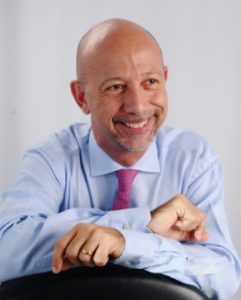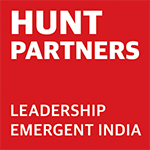Stefano PelleManaging Director ‐ Ferrero India Private Limited
Stefano Pelle obtained a Master’s Degree with honors in Economics from LUISS University of Rome and a post graduate diploma in Marketing from the School of Management, LUISS. He completed his second Master Degree in Political Science from La Sapienza, University of Rome. During his career he attended executive education programs in renowned institutes such as HEC, ESSEC, INSEAD and LBS.
He started his marketing career in 1987 with Johnson and Johnson. After which he joined the Danone Group with an international responsibility. After spending 6 years in the FMCG sector, he moved to the services Industry as Marketing Director of Iberia Airlines and subsequently joined the Italian Railways as the Marketing and Sales Director. He then joined the Perfetti Van Melle Group, the world’s third largest sugar confectionery group makers of Mentos and Chupa Chups, to oversee their India operations as the Managing Director.
He then moved back to India in 2014, heading the South Asia and Africa Region for Piaggio Group, the producers of the iconic Vespa. Currently he is Managing Director for the South Asia Region for Ferrero, the world’s third largest chocolate producer.
Despite his busy schedule, he published the book “Understanding Emerging Markets: Building Business BRIC by Brick” and “When not in Rome don’t do as Romans do” (SAGE, New Delhi). Apart from this he also published several articles on various topics in management journals, newspapers and magazines He has cooperated with several Business Schools and Universities and lectures in LUISS University of Rome on International Marketing and LUISS Business School on International Business and has been a visiting scholar in California Lutheran University, Thousand Oaks (L.A.)
For his work in South Asia, he received the high award of Knight Commander (Commendatore) from The President of Italy in 2006.

1. What was the mandate given to you by the Board when you took over in your role?
I will talk about my previous role at Piaggio. I was hired with the objective of re-launching the two wheeler business as well as expanding the presence in the light commercial vehicle market.
The two wheeler business gained a good momentum with launch of the second scooter under a different brand and streamlining of the dealer network strategy. In the first full year from the launch of the above scooter the overall volume sold was more than double with consequent major benefit for the factory utilization as well as the profitability. In the light commercial vehicle market we re-launched a city vehicle which more than doubled the market share in this segment within one year from the relaunch.
2. How much of that has been achieved? What were the challenges faced?
In order to achieve the above, we had to convince the headquarter for a substantial investment for the new projects, while finding the way to produce at competitive cost with relatively small volumes.
3. What are the key challenges your organization is facing currently? And what are the steps you are taking?
Since I’m talking about my previous working experience I won’t be able to answer this question at this point of time.
4. How have the changes in technology/globalization/economy affected your sector?
The passage to stricter emission standards (BS4 and later BS6) imply significant investments to comply with the required standards.
Increasing of consumer’s purchasing power at time implies a shifting in mode of transport. Therefore those who would use “autorikshaw” would upgrade by buying a two wheeler and two wheeler owners would upgrade by buying a four wheeler, hence affecting the growth of such segments.
5. What is your talent strategy? How do you draw the balance between home grown vs lateral hiring at the leadership level?
Switching to my new and current role at Ferrero, We endeavor to build winning teams and highly competitive global organization with the right people, structure, processes and systems in place. Our focus is to build the existing talent pipeline by creating excellence in learning and development experiences, strengthen talent attraction, and create outstanding candidate experiences.
Ferrero has a very unique way of doing business, and this know-how is crucial to retain talent. We really invest in our employees to help them develop a high level of Ferrerita’. As the organization is evolving, and expanding our presence around the world, it is also important to diversify our leadership pool by exploring top class talent from the market to add value to the business. We operate with the important baseline that we must preserve our core values and way of business, but also change and acquire new skills, to adapt to the new challenges in the business world.
6. How does your organization identify and develop future leaders?
We have strong processes of monitoring, developing and managing talent, which helps us identify key positions, and high-potential future leaders. We work with leading learning organizations at group and local levels on customized assessment centers, to identify high potential, creating development plans, and map them to short term and long term successors for key and leadership positions. The organization promotes internal job posting for key critical position to show career progression and develop them as future leader.
7. In a world full of volatility, Uncertainty, complexity & Ambiguity (VUCA), innovation has become one of the most important factor to transform a crisis into an opportunity. How do you promote Innovation?
The organization also work on building a young talent pipeline and integrating them with Ferrero global managerial programs to fast track their growth and assimilation in the organization. We also leverage on mentoring practices to grow with knowledge sharing and experience. The identified HIPO are also given opportunity to go through a tailor made master’s program from reputed universities.
8. How do you define & practice leadership?
Ensuring that people follow your vision with effectiveness and motivation. I practice leadership by being coherent, empathetic and empowering my team members.
9. What are the 3 most pivotal moments in your career that you either learned from and/or that got you where you are today?
Getting in to my first leadership role at a young age (28 years old) and having senior people reporting to me which helped me improve my people skill and learn how to handle
The transfer to India as an expatriate helped me looking at the world from a different perspective
The assignment of a large area responsibility as President of a large region gave me the opportunity of handling several Business Units and getting to know a large number of markets
10. What message would you like to share with young professionals at the start of their career?
To work hard with clear objectives in mind and a long term perspective always pays back. Youth should not be in a hurry to take the first available job and get the highest pay: learning most, rather than earning most, is essential at the beginning of one’s career.
